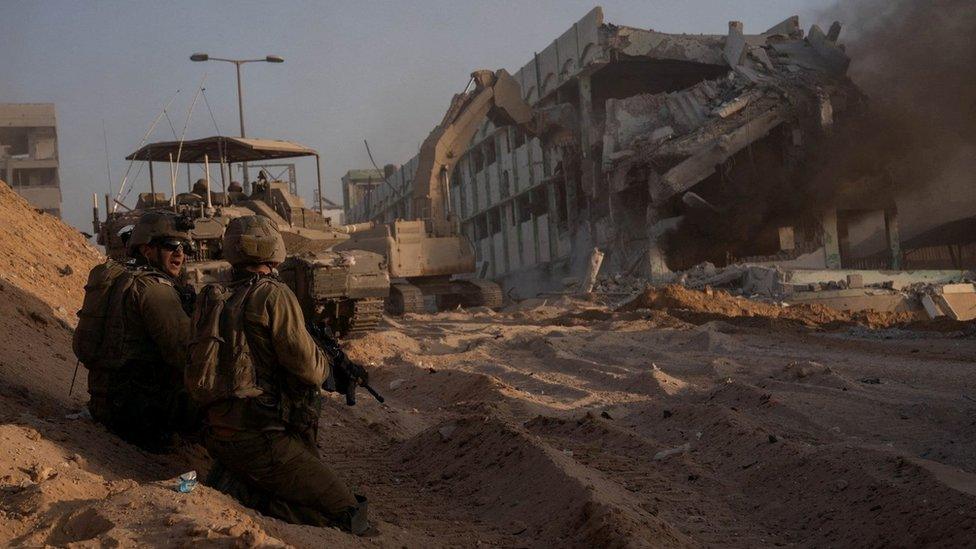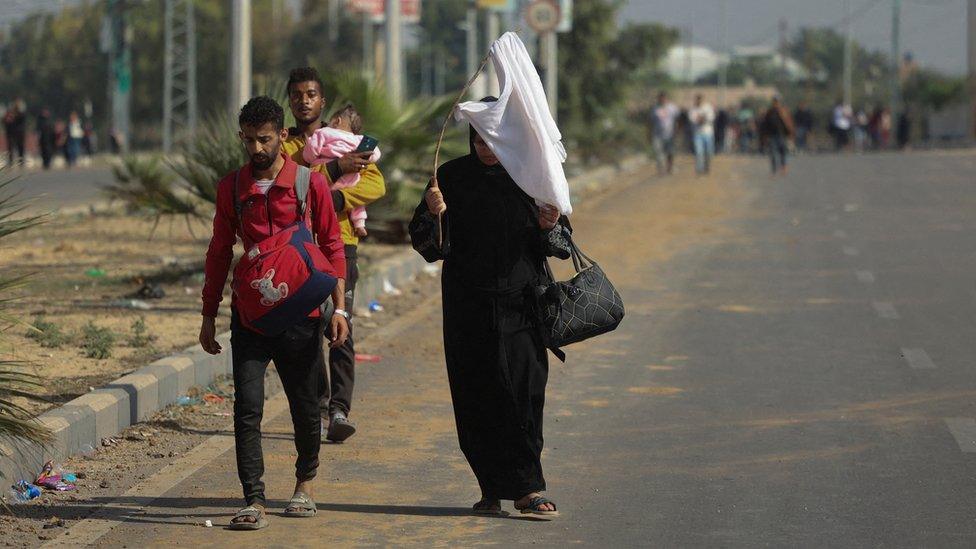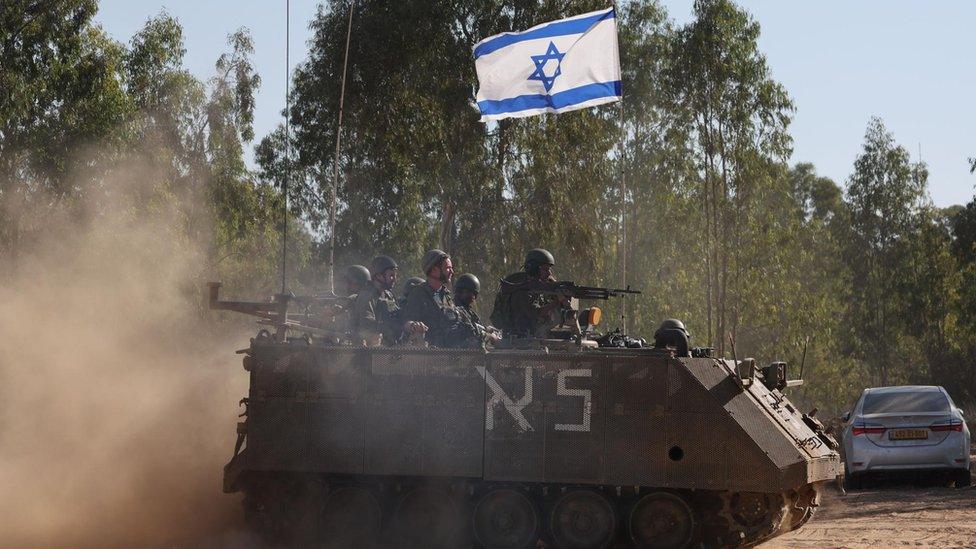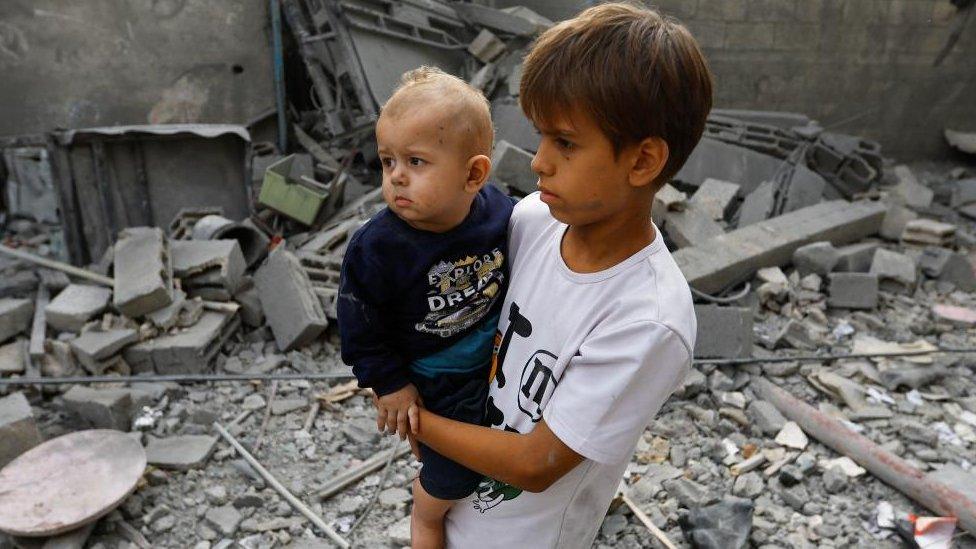US warns Israel against reoccupying Gaza after war
- Published

The Israeli military said on Tuesday that it was fighting its way deep into Gaza City
US Secretary of State Antony Blinken has warned that Israel cannot reoccupy Gaza after the war with Hamas ends.
Mr Blinken also insisted Hamas could not continue to rule there as it risked a repetition of the 7 October attacks.
He said there should be no forced displacement, blockade or reduction of territory, and that the West Bank-based Palestinian Authority should govern.
Prime Minister Benjamin Netanyahu has said Israel will have "overall security responsibility" for Gaza indefinitely.
He did not elaborate on what that would entail when he made the comment in an TV interview on Monday, but a senior Israeli official told reporters in Washington on Tuesday that Israel had no intention of reoccupying Gaza or controlling it for "a long time".
Israel has been bombarding the territory for a month and began a major ground offensive over a week ago with the objective of destroying Hamas, which it, the US and other Western powers consider a terrorist organisation.
The war began after an unprecedented cross-border assault on southern Israel by Hamas on 7 October, in which 1,400 people were killed and 240 others taken hostage.
Gaza's Hamas-run health ministry says more than 10,500 people have been killed in the territory since then, while the UN is warning that an "unfolding catastrophe" is making a humanitarian ceasefire more urgent.

More on Israel-Gaza war
Follow live: Latest updates
From Gaza: Palestinian given two hours to evacuate whole neighbourhood
From Israel: Pain still raw a month after Hamas attacks
History behind the story: The Israel-Palestinian conflict

At a meeting in Tokyo, foreign ministers from the Group of Seven (G7) wealthy nations declared that they supported "humanitarian pauses and corridors to facilitate urgently needed assistance, civilian movement and the release of hostages". But they stopped short of calling for a ceasefire.
At a news conference afterwards, Mr Blinken set out the Biden administration's position on what a post-conflict Gaza should look like.
"The United States believes key elements should include no forcible displacement of Palestinians from Gaza. Not now. Not after the war," he said.
"No use of Gaza as a platform for terrorism or other violent attacks. No reoccupation of Gaza after the conflict ends. No attempt to blockade or besiege Gaza. No reduction in the territory of Gaza."
"We must also ensure no terrorist threats can emanate from the West Bank."
The secretary of state said "affirmative elements" were necessary for a "sustained peace".
"It must include Palestinian-led governance and Gaza unified with the West Bank under the Palestinian Authority," he said.
"And it must include a sustained mechanism for reconstruction in Gaza, and a pathway to Israelis and Palestinians living side-by-side in states of their own, with equal measures of security, freedom, opportunity and dignity."
When asked about the Israeli prime minister's comments, he said there would need to be a "transition period at the end of the conflict" but that he did not believe Israel intended to reoccupy and govern Gaza.

The UN says 1.5 million Palestinians in Gaza have been displaced, with thousands fleeing the north on Tuesday
Israel occupied the West Bank, East Jerusalem and Gaza in the 1967 Middle East war. Although it withdrew its forces and settlers from Gaza in 2005, the UN still considers the territory occupied because Israel retains control over its air space, coastal waters and shared border.
On Tuesday, Israeli Minister of Strategic Affairs Ron Dermer clarified to the BBC what Mr Netanyahu had meant by "security responsibility".
"Governance requires an administration we assume will be Palestinian," he said. "There's a question of the overriding security responsibility, that's what he was talking about, to ensure that in a post-Hamas Gaza we don't have the re-emergence of a terror threat from in Gaza."
"Israel wasn't operating or doing any operations in Gaza, and we saw what happened over nearly two decades," he added. "They built this terror state right on the south of Israel and we saw the effects of this."
He also doubted whether the Palestinian Authority - which governs parts of the occupied West Bank not under full Israeli control and is dominated by the Fatah movement, Hamas's rival - was the right body to govern Gaza.
"They haven't shown their ability there to actively fight terrorism," he added.
Mustafa Barghouti, head of the Palestinian National Initiative, was sceptical about what Mr Netanyahu was saying in public.
"When he says that he wants to keep the security control of Gaza forever that means he's planning to annex Gaza to Israel," he told the BBC.
Mr Barghouti said Palestinians needed a unified leadership that "could prepare the ground for free democratic elections and end the occupation, not only of Gaza Strip but also of the West Bank and East Jerusalem".
On the ground on Wednesday, the UN said thousands more people had fled northern areas as Israeli troops battled Hamas fighters deep inside Gaza City.
For a second day, crowds were seen walking southwards along Salah al-Din Road during a window announced by the Israeli military.
Many said they had run out of food and water or were frightened by news of Israeli forces' advances, while UN monitors reported that some had to cross Israeli checkpoints, where they saw people arrested.
Israel's military is focusing its operations on Gaza City, where it claims Hamas has its central command and a vast network of tunnels.
Hundreds of thousands of people have now heeded Israeli orders to move to the south since the war began, although in recent days Israel has continued to strike what it says are Hamas targets there and civilians have been killed.
- Published7 November 2023

- Published28 October 2023
